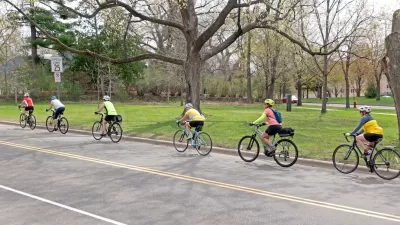Susan Klemond looks at what it will take to protect and expand the Twin Cities's tremendous legacy of parks to meet the changing demographics and needs of the area's population.
A century ago, visionary planners and civic leaders in Minneapolis and St. Paul created a system of parks that are still treasured in the Twin Cities. Klemond looks at how Jayne Miller, Minneapolis Park and Recration Board superintendent, and other civic leaders in the area plan to maintain, evolve, and expand the Twin Cities's side-by-side park systems amid changing demographics, park needs, and ecological
considerations.
Two major elements of this planning effort are RiverFIRST and the Great River Passage, which envision how to develop parks and natural areas along 25
miles of the Mississippi River corridor in Minneapolis and St. Paul, respectively. "While
many cities around the world are now looking at their riverfronts, the
combined 25-mile Minneapolis/St. Paul corridor is the longest ever
undertaken as a unit, says Bruce Chamberlain, Minneapolis assistant
superintendent of planning."
Other efforts are looking at how to adapt park uses to suit the desires of changing demographics, re-envisioning the typical rec center, developing an ecological system plan, and facilitating urban agriculture.
FULL STORY: Creating public parks 3.0: new demographics, new needs

Maui's Vacation Rental Debate Turns Ugly
Verbal attacks, misinformation campaigns and fistfights plague a high-stakes debate to convert thousands of vacation rentals into long-term housing.

Planetizen Federal Action Tracker
A weekly monitor of how Trump’s orders and actions are impacting planners and planning in America.

In Urban Planning, AI Prompting Could be the New Design Thinking
Creativity has long been key to great urban design. What if we see AI as our new creative partner?

King County Supportive Housing Program Offers Hope for Unhoused Residents
The county is taking a ‘Housing First’ approach that prioritizes getting people into housing, then offering wraparound supportive services.

Researchers Use AI to Get Clearer Picture of US Housing
Analysts are using artificial intelligence to supercharge their research by allowing them to comb through data faster. Though these AI tools can be error prone, they save time and housing researchers are optimistic about the future.

Making Shared Micromobility More Inclusive
Cities and shared mobility system operators can do more to include people with disabilities in planning and operations, per a new report.
Urban Design for Planners 1: Software Tools
This six-course series explores essential urban design concepts using open source software and equips planners with the tools they need to participate fully in the urban design process.
Planning for Universal Design
Learn the tools for implementing Universal Design in planning regulations.
planning NEXT
Appalachian Highlands Housing Partners
Mpact (founded as Rail~Volution)
City of Camden Redevelopment Agency
City of Astoria
City of Portland
City of Laramie





























